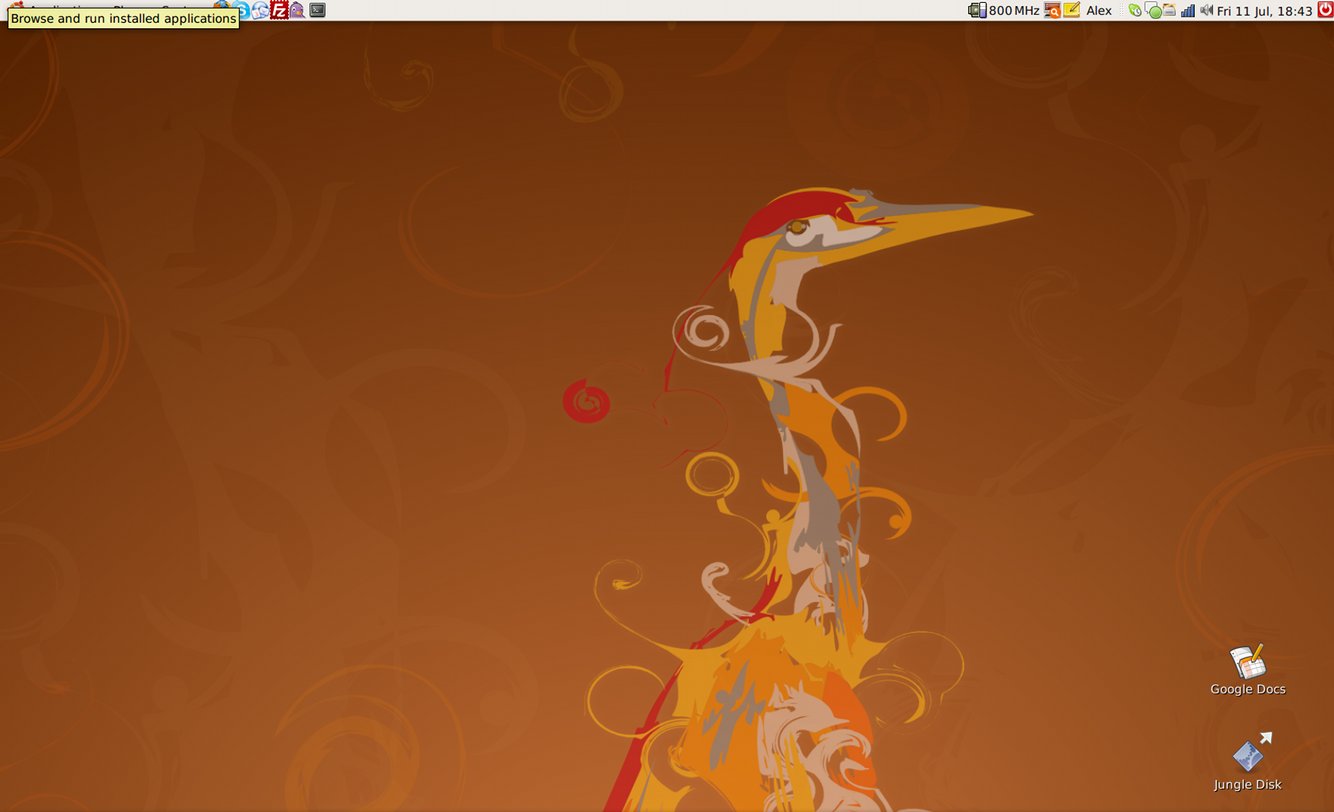Ubuntu – making Linux a reality for small business, but who cares?
Like many small business owners, I just want computer hardware, operating systems and software to work and work well. Form is important, but give me function and reliability first.
Despite much promise …
Like many small business owners, I just want computer hardware, operating systems and software to work and work well. Form is important, but give me function and reliability first.
Despite much promise and apparent improvements over recent months, Vista simply hasn’t done it for me. It’s not done much for my top end laptop either which crawls to the starting line rather than racing to victory over everyday tasks.
I very nearly used my frustration to succumb to the MacBook Air I’ve long lusted after. But enter Linux. Or more precisely Ubuntu, a version or ‘distro’ of Linux that’s been getting a lot of attention in the open source world.
Installation
Installing Ubuntu was a leap of faith. When I put the installation disk into my ThinkPad T61p’s drive, my expectations were low. I girded my loins for driver incompatibility hell, network problems and cack-handed attempts on my part to get to grips with command lines that I’d not seen on a computer for over 15 years.
Guess what? Wifi connections, printers, networks, applications all identified and installed smoothly. The Nvidia graphics card needed a trivial update and fonts needed tweaking, but for a basic setup that was about it. The Hardy Heron version of Ubuntu even looks cool. I think brown could be the new blue.
Inspiration
The operating system comes pre-installed with a complete set of office applications (OpenOffice) which make the expensive Microsoft Word, Powerpoint and Excel redundant for most small businesses. It also includes graphics packages, email, IM and lots of other good stuff.
What’s more it’s all free. It runs fast. It’s secure and isn’t subject to the volume of hacks and viruses inflicted on Windows. It’s all built by an amazing community. It’s a great option for SMEs and it’s a great option for huge swathes of developing nations. As you can probably tell, conceptually and simply from the experience of using it day-to-day, I’ve really enjoyed it.
Now before my kumbaya-like joy forces you to run from the room screaming ‘kill all hippies’, let’s get to the buts. Like the ones in pub ashtrays of old, there are plenty.
Bish, Bosh, Bash
If something does go wrong, you are rapidly propelled to command prompts, bash scripts and sudo. Exactly.
Ubuntu As Religion
There’s plenty of online support, but it’s poorly structured and occasionally makes you feel like you’ve entered the realms of an arcane cult.
Multimediaaaarrgghhh
If you need any kind of sophisticated video or audio applications, then things can get enormously complicated, enormously quickly, despite the multimedia flavour of Ubuntu known as Medibuntu. Many web cams, for example, are certainly not ‘plug and play’.
On No Account
Serious accounting/financial apps on Linux are non-existent. Accounts departments will need to run Windows or something like Virtual Box to get the job done.
Cheap, cheap
Buying Linux computers is not necessarily cheaper than buying Windows machines. New Windows machines are cross subsidised by software vendors and are often cheaper than computers with Linux pre-installed. Linux could save you on multiple software licenses though.
No Rest
I’ve installed Ubuntu on three laptops. All have issues with hibernation, which is a pain. And I’m not at all sure they’re handling power management effectively either.
Of course, in a business context any computer and software combination is going to need support. That’s what Canonical, the moving force behind Ubuntu, provides. And as Gerry Carr, marketing manager at Canonical suggests:
Many businesses do not move completely – they slowly introduce Linux into more and more parts of their business as appropriate to their needs and where they are in the licensing cycle.
This seems like a sensible strategy. The windows installer Wubi, is one way of trying out Ubuntu and helping people appreciate the benefits. Because Hardy Heron looks good you may find people warming to the interface quickly.
Nevertheless, Nic Butler, the well known UK social media man and long time open source software and Ubuntu evangelist, believes familiarity with Windows doesn’t breed contempt so much as laziness when it comes to adapting to new computer experiences.
He also believes that Ubuntu may already have missed its break through opportunity on the desktop. Does Canonical’s increased focus on server and mobile versions of Ubuntu suggest they feel the same, he ponders.
Who Cares?
While I agree with Nic, I think Ubuntu now contains so many familiar features that user laziness is not such a big issue.
My wife also runs her own business. She’s no geek. She doesn’t care about technology, she just wants to get things done. Her XP laptop was grinding to a halt. She loves Ubuntu because her machine’s now working faster and does all the things she needs it to: word processing, spreadsheets, web and email. As a simple, fast, reliable operating system for a small business computer, Ubuntu cuts the mustard.
But as more and more basic business software for email, project management, VoIP and, yes, even accounting moves away from the desktop to remote services (the cloud), who’s going to care about operating systems in the future?
In some ways the Asus Eee PCs with their stripped down Linux systems are the first computers to recognise this. And perhaps this is where Ubuntu should focus. My Ubuntu laptop is already a no fuss, low fat Linux gateway to the clouds and that’s where business is increasingly getting done.
Leave a comment
Share & Comment
Related Posts
SME News
- Entrepreneurs 2012 with President Bill Clinton 13-16 November
- IDCEE 2012. Internet Technologies and Innovations
- Nurturing the next generation of social entrepreneurs
- Get Britain Trading needs you
- Manufacturing gains, but economy fragile
- Minister to answer webcast questions on apprenticeships
- Staff beat £230 million a day cost of big freeze
 SME Blog
SME Blog

 10 comments
10 comments












Interesting – and after 11 years or more of having my geek friends insist that Linux on the desktop was going to kill Microsoft “within the next 12 months”, it’s good to see that it is at least usable now. I guess the speed is a big selling point and goes some way to combat the sometimes clunky UI of many Linux apps. The things that I tend to notice are very subtle but cumulatively make quite a difference to the usage experience – little details of how keyboard shortcuts work, the visual feedback mechanisms as you click or mouseover on different widgets, etc. These all contribute to make the OS just “feel” right – it’s quite subconscious but improves the user experience a lot.
Microsoft is actually really good at this stuff (Apple is even better) and with so many millions of hours of testing and usability lab work having gone into the Microsoft infrastructure, these details are going to be hard to replicate for an open source platform. I am sure they will get there one day, and the current generation of Linux desktops is definitely miles ahead of the old one. And if Ubuntu is faster and more responsive than Vista, that would provide a big improvement to that subconscious experience of usability – enough to beat all those subtle little touches of Microsoft’s? I don’t know, though I suspect not – but I will keep an open mind.
Incidentally there are quite a few Web-based accounting packages emerging – my company (Inon) makes one and there are a number of alternatives. Dennis Howlett’s Accman blog might be a place to start if you’re interested, and Accountingweb has reviews from time to time. Most of these are entirely usable from a Linux desktop, and many have other big advantages over traditional Sage-like packages.
Hi Leigh, if you use lots of sophisticated desktop apps, then Linux is probably going to feel a little clunky in places.
However, in general I’ve been very pleasantly surprised at how sophisticated and often more intuitive the user interface is than Windows.
And as I say, if you’re using web-based apps, then speed, efficiency, security as well as an attractive UI and zero license fees are going to become increasingly attractive.
Why else is Microsoft concentrating on Mesh and Silverlight?
Linux is never going to be a Windows killer (not enough marketing budget and commercial tie ups!), but like Firefox it might begin to grab a larger slice of the action.
Hi Alex,
Nice (and fair) review; FWIW there are open source accounting packages, but they tend to be web based (e.g. sql ledger etc) and don’t readily lend themselves to e.g. UK taxation etc… so aren’t of much use if you want them to do your own Payroll.
In my company (palepurple.co.uk) we’ve been using Linux on the desktop exclusively for the last 3 years – but we still have a vmware server hidden in the corner, running a Windows virtual machine for Quickbooks.
Hi David, good to see a real small business case study for Linux. I’m doing exactly the same as you. Virtual Box set up to allow me to use the Windows version of my accounting software.
Who cares?
Microsoft! For sure.
Oh and ….
Dell
Acer
Asus
Sony
IBM
all for different reasons.
FWIW – I run a small (ish) business and we use Linux on servers plus some Ubuntu desktops. The rest of the desktops are XP and as they are replaced they will end up either as thin clients or Linux machines.
David, its worth mentioning though that your company is part of the cycle of products which I highlighted to Alex. Your offering Software as a Service. Ive not seen any Desktop core application development in your line up.
Thanks to the browser and the internet the relevancy of winning the desktop war has become pointless. Hence Ubuntu as a regenerator of older architecture and a simple mechanism with which to distribute a basic desktop install is a winner. Though as Alex points out without sufficient marketing and product tie in, no one will care.
Its great to hear about SMes making use of Ubuntu and other linux desktops but I feel that its past its time to make that land grab worthwhile.
Ubuntu on the server however is a stunning proposition that has consistently beat down windows for scalability and administration.
Nik – I’m not sure; I think the percentage of non-windows desktops is increasing – and many people seem eager to shun Vista for whatever reason.
Yes – my company develop web applications which are cross platform – and in Open Source languages – which aid longer term maintenance and development. But there are huge numbers of businesses out there relying on e.g. Visual Basic or a text based application running on DOS. We offer a number of advantages over such applications – but it’s normally difficult to change once a system is embedded. The same seems to be true for the desktop!
The obvious problem is that a lot of software written for Windows doesn’t run on Linux – some might via WINE – but it’s normally not that easy to setup/do – and Linux “wizards” are probably relatively difficult to find.
Ubuntu (or RedHat, CentOS or SuSE etc) are all great on the server. There is still a lot of work to be done to make them no-brainer options – management tools often don’t exist, or some functionality just isn’t there (e.g. Active Directory) – but for a small business, it really is something people should investigate (if only for simple file and print sharing!)
Nik – I was looking for you at LugRadioLive – I gather you didn’t go? (At least on Saturday).
thanks
David.
“Serious accounting/financial apps on Linux are non-existent.”
There are few serious accounting apps gaining popularity on Linux Here is one called P2PAccounts and there is an installer for Ubuntu also at this site
Rajesh
[…] As many of you know, Vista hell became too much for me and I spent most of 2008 using Ubuntu. […]
[…] rather than small organizations such as independent hotels.Indeed, although there was a lot of hype in earlier years about the promise Ubuntu offered to small businesses, extending even to the […]